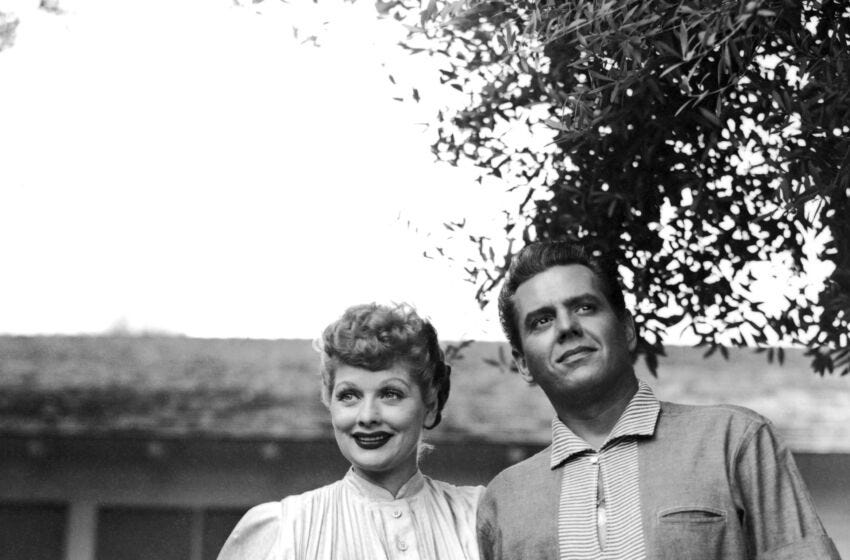New Release Friday: "After Yang," "Lucy and Desi," "Dear Mr. Brody"
One of the best films of the young year and two fine documentaries come to VOD
Note: I’ll be going offline for a bit, visiting family, taking a breather, and doing research for a broader post about the VOD landscape. Be well and see you in a week.
The Nut Graf1: “After Yang” (in theaters and on Showtime, **** stars out of ****) is a spooky, profound tale of love and consciousness set the day after tomorrow. “Lucy and Desi” (on Amazon Prime, *** stars out of ****) is a warm love letter to a pioneering power couple from director Amy Poehler. “Dear Mr. Brody” (in theaters and on Amazon Prime and Apple TV, *** stars out of ****) documents a forgotten story of 1970s madness and philanthropy.
Today, my favorite movie from this year’s Sundance Film Festival arrives in theaters (in the Boston area at the Coolidge Corner and the Kendall Square) as well as on Showtime. After watching it again the other night, it’s likely to be among my favorite films of the year come December. It straddles science fiction, fantasy, and our shared emotional reality in ways similar to last year’s “Nine Days,” so if you liked that one, you might love “After Yang.” The movie’s also catnip for viewers drawn to dramas set a half-step into the future for their creative thinking about what will change in our lives and what won’t. Spike Jonze’s “Her” scratched that itch for me and so does this new movie from the Korean-American director Kogonada. (His previous film, “Columbus,” is also very much worth a look; I can’t think of a director whose interest in architecture extends from the outsides of buildings to the interiors of people’s heads and hearts.) Here’s what I wrote after seeing “After Yang” at Sundance:
The premise sounds dicey: A family of the near future mourns when its android passes on. But a great director – and on the basis of 2017’s “Columbus” and this, Kogonada qualifies – can create a world in a handful of opening scenes, and the world of “After Yang” is a warm, inviting place that hides existential questions and evanescent moods. The android, Yang (Justin H. Min), has been purchased as an older sibling to Mika (Malea Emma Tjandrawidjaja), the adopted Chinese daughter of Jake (Colin Farrell) and Kyra (Jodie Turner-Smith, the discovery of 2019’s “Queen & Slim”); Yang’s been with the family since Mika’s infancy and one day he simply stops working. As Jake struggles to find a repair shop that will service what turns out to be a most unusual model, “After Yang” probes issues of memory, consciousness, grieving, and more with a gentleness and subtle visual imagination that is utterly captivating.
The film’s production design is a highlight (not surprising for a filmmaker who set a romantic drama amid the modernist architecture of Columbus, Indiana), with all sorts of sublime details in the corners of this day after the day after tomorrow. (We’ll have plants in our self-driving cars, for one thing, and FaceTime technology will have evolved to make every conversation look like an Ozu movie.) Farrell, in a quietly watchful performance, uncorks a terrific Werner Herzog impression at one point, quoting dialogue from “an old 20th century film” his character once saw. (It’s “All in This Tea,” by Les Blank, and it’s from 2007, actually.) The film’s most haunting images are eventually revealed on the android’s memory chip: Hushed shots of Yang gazing at the world and in the mirror, pondering the mystery of being and wondering if that makes him human. By the end of this beautiful movie, you’ll be wondering too.
Two other VOD premieres of note:
“Lucy and Desi,” on Amazon Prime, is an affectionate and thorough documentary that makes a good companion piece to – or an improvement upon – “Being the Ricardos,” the Aaron Sorkin dramatization of behind-the-scenes turmoil on “I Love Lucy” and a movie that asked you to believe that Nicole Kidman could pass for Lucille Ball. (Some did; I sure didn’t.) The doc is directed by Amy Poehler, and you can understand the emotional connection: There are snippets of footage where Ball’s physical resemblance to Poehler is uncanny. “Lucy and Desi” has been made with the help of the couple’s children, Lucy Arnaz Luckinbill and Desi Arnaz, Jr., so don’t come here if you’re looking for dirt on Desi, Sr.,’s womanizing ways. But the film does make an even stronger case than “Being the Ricardos” for Arnaz as an undersung television visionary, whose Desilu productions gave us “Star Trek,” “The Untouchables,” “The Dick Van Dyke Show,” “Mission Impossible,” and many others. Ball was just as instrumental, especially after she bought Desi out in 1960 and became the first woman to run a major studio. All in all, a close study of a pioneering power couple, with early clips that are delightful, “I Love Lucy” scenes that remain as funny as the day they were filmed, and home movies and audio recordings that offer a glimpse of the real woman behind the beloved clown.
“Dear Mr. Brody,” for rental on Amazon Prime and Apple TV, is a documentary that tells a story that has been resurrected from the acid after-burn of history. In 1970, Michael Brody, Jr. (above), the 21-year-old heir to an oleomargarine fortune, announced he was giving away $25 million to anyone who wrote him and asked for a handout. With his wife, Renee (also above), at his side, he appeared on “The Ed Sullivan Show” strumming a guitar and was featured on CBS News with Walter Cronkite (with whom, apparently, he got high), as well as on the front pages of newspapers across the country. It was the hippie days, and Brody told anyone who asked what he was up to that giving his money away was “the only way to find peace.”
He was mobbed, of course, and Keith Maitland’s new documentary had its genesis in the discovery of 12 bins of letters addressed to Brody – over 31,000, all unopened—that film producer Ed Pressman had been keeping in storage for decades after a planned movie version of Brody’s life fell through. Melissa Robyn Glassman, who’d worked for Pressman and who co-produced “Dear Mr. Brody,” became obsessed with the letters – it turned out that there were many, many more – and the most heartbreaking scenes in the movie are the voices of people who were asking for help in ways big and small, for good reasons and bad, but mostly to get out of situations (or to get their loved ones out of situations) that were crushing them.
“Dear Mr. Brody” goes even further: Maitland and Glassman locate some of the letter writers today, visit them in their homes, and ask them to read their letters for the camera. These scenes are overpowering – a Native American woman who tried to get off the reservation and failed; three grown daughters reading their late mother’s letter asking for funds to underwrite a typing school that would lift her out of poverty; a woman who wrote Brody as a 14-year-old pleading for help with an alcoholic father and shocked to learn that her mother wrote Brody, too. Their lives, then and now, come across so vividly that it’s somewhat sickening to realize that Brody had no idea how he was going to pay anyone.
Why? Because he was mentally ill and taking too many drugs – “Do you know much about PCP?” asks one of this film’s talking heads – and, anyway, his bank stopped cashing the checks. Looking at the news footage of Brody today, it’s astonishing that no one registered how disturbed he was, so blinded was everyone by the money, or the promise of the money, or the grabbiness of the story. Everyone wanted a piece, and the only people who didn’t get one were those who needed it. There’s a sad American folk tale lurking in the cracks of “Dear Mr. Brody,” and Maitland is mostly successful at winkling it out; the film is over-directed and antic in spots but unexpectedly touching in others, and it’s paced for maximum involvement and lingering melancholy.
Maitland also directed “Tower” (2016), a documentary about the 1966 University of Texas tower shootings that has one of the most wrenching reveals I’ve ever seen in a non-fiction film. If this latest work isn’t quite on that level, it still has the power to haunt you for some time to come. “I’m a big phony! I’m not real!,” we see Michael Brody scream at one of the reporters tailing him, and the enduring mystery is that no one took him at his word.
If you enjoyed this edition of Ty Burr’s Watch List, please feel free to share it with friends.
If you’re not a paying subscriber and would like to sign up for additional postings and to join the discussions, here’s how:
If you’re already a paying subscriber, I thank you for your generous support.








